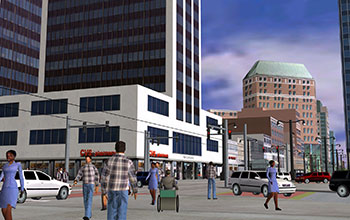Multimedia Gallery
Urban Visualization and Planning Studies (Image 2)
A multifaceted, interactive real-time visualization of what activity on Main Street in downtown Buffalo, N.Y., will be like if vehicular traffic returns after an absence of more than 20 years.
Vehicular traffic was eliminated from approximately 11 blocks of Main Street in the heart of downtown Buffalo, with the creation of a light-rail rapid transit system and a pedestrian mall. The extremely detailed visualizations, developed by the Center for Computational Research (CCR) at the University at Buffalo, immerse spectators in the traffic data so that they can experience the traffic as if they were standing on a street corner, riding on a metro train, or driving along Main Street. Merchants can view the flow of automobile and pedestrian traffic from the perspective of their storefronts. The simulation was developed for DiDonato Associates for the City of Buffalo, Niagara Frontier Transportation Authority and Buffalo Place.
CCR is a member of the Coalition for Academic Scientific Computation, or CASC. The National Science Foundation is one of several federal agencies in partnership with CASC, whose members develop partnerships with federal and state government entities, as well as with private industry leaders, to contribute to strategic national goals. (Date of Image: September 2006) [Image 2 of 4 related images. See Image 3.]
Credit: Adrian Levesque, Martins Innus and Adam Koniak, Center for Computational Research IBC Digital
See other images like this on your iPhone or iPad download NSF Science Zone on the Apple App Store.
Images and other media in the National Science Foundation Multimedia Gallery are available for use in print and electronic material by NSF employees, members of the media, university staff, teachers and the general public. All media in the gallery are intended for personal, educational and nonprofit/non-commercial use only.
Images credited to the National Science Foundation, a federal agency, are in the public domain. The images were created by employees of the United States Government as part of their official duties or prepared by contractors as "works for hire" for NSF. You may freely use NSF-credited images and, at your discretion, credit NSF with a "Courtesy: National Science Foundation" notation.
Additional information about general usage can be found in Conditions.
Also Available:
Download the high-resolution JPG version of the image. (1.9 MB)
Use your mouse to right-click (Mac users may need to Ctrl-click) the link above and choose the option that will save the file or target to your computer.

